NCERT Solutions for Chapter 11 Constructions Class 9 Maths
Book Solutions1
Answer
Steps of construction:
I. Draw a ray OA.
II . Taking O as centre and suitable radius, draw a semicircle, which cuts OA at B.
III. Keeping the radius same, divide the semicircle into three equal parts such that
IV. Draw
V. Draw , the bisector of ∠COD.
Thus, ∠AOF = 90º.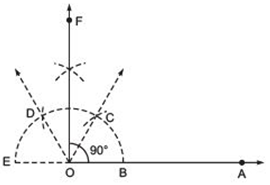
Justification:
∵ O is the centre of the semicircle and it is divided into 3 equal parts.![]()
⇒ ∠BOC = ∠COD = ∠DOE
[∵ Equal chords subtend equal angles at the centre]
∵ ∠BOC + ∠COD + ∠DOE = 180º
⇒ ∠BOC + ∠BOC + ∠BOC = 180º
⇒ 3∠BOC = 180°
∴ ∠BOC = 60º
Similarly,
∠COD = 60º and ∠DOE = 60º
∵ OF is the bisector of ∠COD.![]()
Now, ∠BOC + ∠COF = 60º + 30º
⇒ ∠BOF = 90º
or ∠AOF = 90º
2
Answer
Steps of construction:
I. Draw a ray ![]()
II. Taking O as centre and with a suitable radius, draw a semicircle such that it intersects ![]() at B.
at B.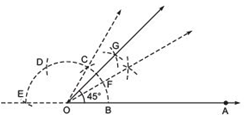
III. Taking B as centre and keeping the same radius, cut the semicircle at C. Similarly cut the semicircle at D and E, such that ![]() . Join OC and produce.
. Join OC and produce.
IV. Divideinto two equal parts, such that ![]()
V. Draw OG, the angle bisector of ∠FOC.
Thus, ∠BOG = 45º
or ∠AOG = 45º
Justification: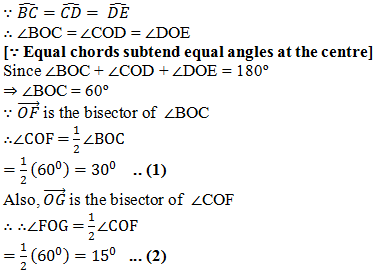
Adding (1) and (2), we get
∠COF + ∠FOG = 30º + 15º = 45º
∠BOF + ∠FOG = 45º [∵ ∠COF = ∠BOF]
⇒ ∠BOG = 45º
3
(i) 30º
(iii) 15º
Answer
(i) Angle of 30ºSteps of construction:
I . Draw a ray OA.
II . With O as centre and a suitable radius, draw an arc, cutting
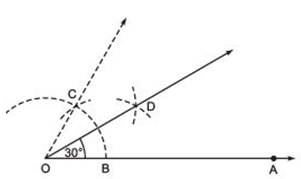
III. With centre at B and the same radius as above, draw an arc to cut the previous arc at C.
IV. Join
V. Draw
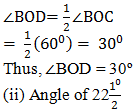
Steps of construction:
I . Draw a ray
II. Draw an angle ∠AOB = 90º
III. Draw OC, the bisector of ∠AOB, such that
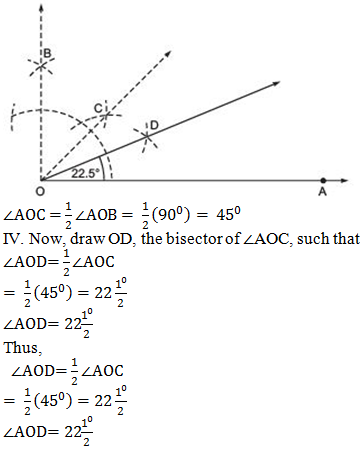
(iii) Angle of 15º
Steps of construction:
I. Draw a ray
II. Construct ∠AOB = 60º.
III. Draw
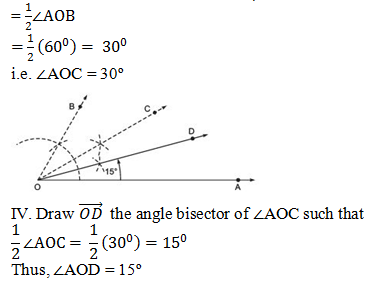
4
(i) 75º
(ii) 105º
(iii) 135º
Answer
(i) Angle of 75º:
Hint: 75º = 60º + 15º
II. An arc BAE is drawn with O as a centre.
III. With E as a centre, two arcs are A and C are made on the arc BAE.
IV. With A and B as centres, arcs are made to intersect at X and ∠XOY = 90° is made.
V. With A and C as centres, arcs are made to intersect at D
VI OD is joined and and ∠DOY = 75° is constructed.
Thus, ∠DOY is the required angle making 75° with OY.
Steps of construction:
I. Draw
II. With O as centre and having a suitable radius, draw an arc which meets
III. With centre B and keeping the radius same, mark a point C on the previous arc.
IV. With centre C and the same radius, mark another point D on the arc of step II.
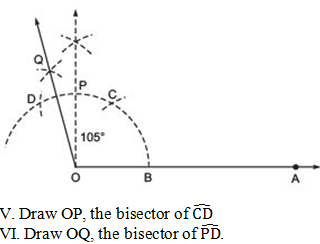
Thus, ∠AOQ = 105º
(iii) Angle of 135º:
Hint: 120º + 15º = 135º
Steps of construction:
I. Draw a ray ![]() ,
,
II. With centre O and having a suitable radius draw an arc to meet OP at A.
III. Keeping the same radius and starting from A, mark points Q, R and S on the arc of step II.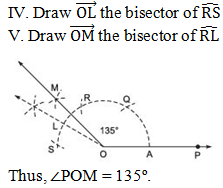
5
Answer
Let us construct an equilateral triangle, each of whose side = PQSteps of construction:
I. Draw a ray
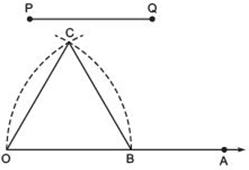
II. Taking O as centre and radius equal to PQ, draw an arc to cut OA at B
such that OB = PQ
III. Taking B as centre and radius = OB, draw an arc, to intersect the previous arc at C.
IV. Join OC and OB.
Thus, ΔOBC is the required equilateral triangle.
Justification:
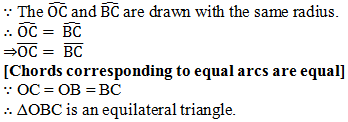
1
Answer
Steps of construction:
I . Draw a ray BX.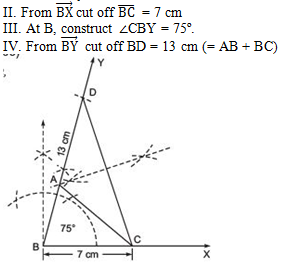
V. Join D and C.
VI. Bisect DC such that the bisector of DC meets BD at A.
VII. Join AC.
Thus, ΔABC is the required triangle.
2
Answer
Steps of construction:I . Draw a ray
II. From
III. Construct ∠CBY = 45º.
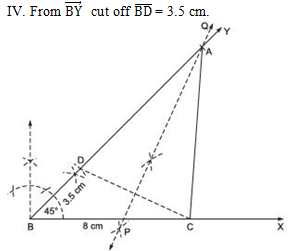
V. Join D and C.
VI. Draw PQ, perpendicular bisector of DC, which intersects
VII. Join AC.
Thus, ABC is the required triangle.
3
Answer
Steps of construction:
I . Draw a ray ![]() .
.
II. From![]() , cut off QR = 6 cm.
, cut off QR = 6 cm.
III. Construct a line YQY' such that ∠RQY = 60º.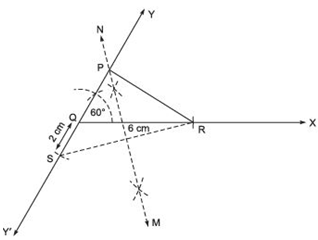
IV. Cut off QS = 2 cm (from QY').
V. Join ‘S’ and ‘R’.
VI. Draw MN, perpendicular bisector of SR, which intersects QY at P.
VII. Join P and R.
Thus, PQR is the required triangle.
4
Answer
Steps of construction: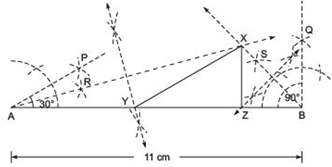
I . Draw a line segment AB = 11 cm = (XY + YZ + ZX)
II. Construct ∠BAP = 30º = ∠Y
III. Construct ∠ABQ = 90º = ∠Z
IV. Draw![]() the bisector of ∠BAP.
the bisector of ∠BAP.
V. Draw ![]() , the bisector of ∠ABQ,
, the bisector of ∠ABQ,
such that ![]() and
and ![]() intersect each other at X.
intersect each other at X.
VI. Draw perpendicular bisector of AX, which intersects AB at Y.
VII. Draw perpendicular bisector of XB, which intersects AB at Z.
VIII. Join XY and XZ.
Thus, XYZ is the required triangle.
5
Answer
Steps of construction:I . Draw
II. Construct ∠CBY = 90º.
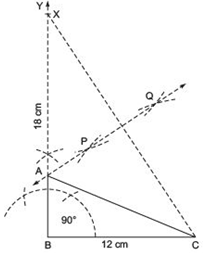
III. From
IV. Join CX.
V. Draw PQ, the perpendicular bisector of CX, such that PQ meets BX at A.
VI. Join AC.
Thus, ABC is the required triangle.